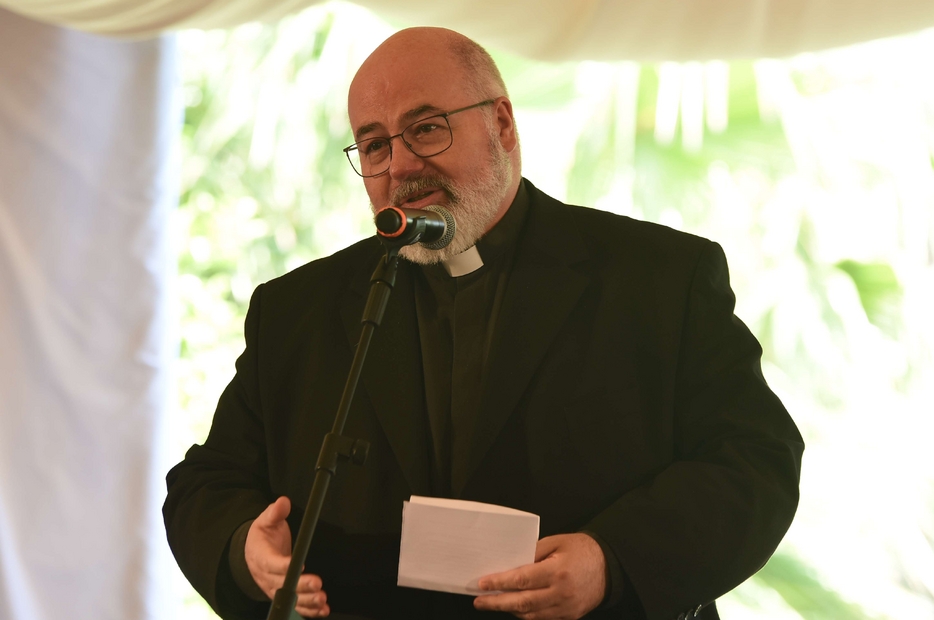<!––>
Don Massimo Angelelli, director of the National Office for the Pastoral Care of Health of the CEI – Photo Carla Picciau
There is a real fatigue in what we are experiencing, the so-called restart. The term is correct, because in the last two and a half years we have lived days of stasis, still and closed in our environments. Now we are leaving. A sign of this is our National Convention on Pastoral Care of Health (Cagliari, 10-12 May 2022) which we are experiencing in the presence after three years.
I have read in some faces the fatigue in the restart: we still have tiredness to process and some thoughts to dissolve. Starting again is not so immediate. I realized this by listening to many people from the great Italian health pastoral network represented at the conference. The last few months have been months of fear, loss and suffering, but also of a profound need to return to life.
We are alive and we want to live, this is the key to our restart, we do not want to survive or avoid death, we do not want to defend ourselves or be afraid to live, nor fear of meeting and embracing the other by rediscovering the beauty of relationships. The Church feels the need to testify since it has always been a prophetic sign. I ask myself: what do we want to testify at this moment?
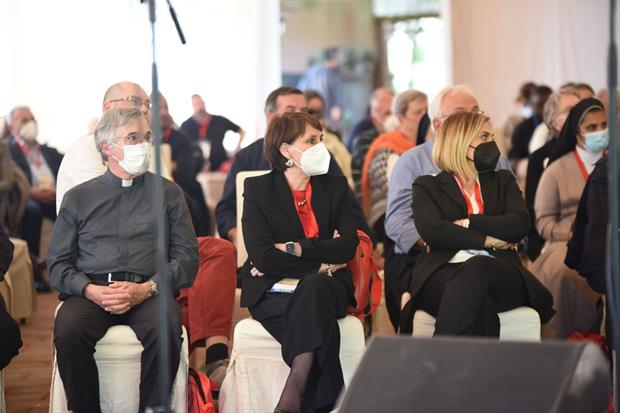
Costanza Mirisola (Inmp General Manager) and Ketty Vaccaro (Censis Welfare and Health Manager) in the audience at the Conference – Photo Carla Picciau
The images of the news of these days have appeared. I thought about the story that took place at the Azovstal steel mills, where men, women and children were imprisoned for eight weeks in the dark and rotten tunnels. A few days ago he was finally allowed to go out. They were dazzled by the sunlight they hadn’t seen in weeks. When one lives this situation, what does one need? Surely to eat, to wash, to get dressed, but looking at those images I thought that their greatest need was to feel reassured. Reassured that it is possible to sleep the next night without fear, reassure that no one will try to shoot him on sight. It is a bit like the situation that pervades many of us right now: we need to be reassured because the invisible enemy of the virus has frightened us, and a little wounded us. We must reassure ourselves that it is possible to work for a different, safe world, in which prevention puts me in a position not to get sick, but above all for a world of peace in which each of us has the opportunity to live in the way we see fit.
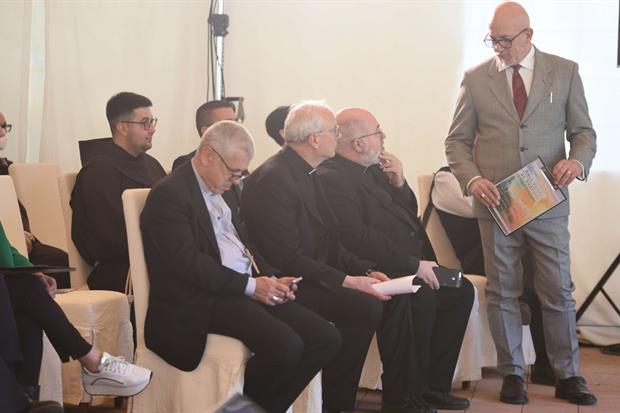
Goianno Cervellera, conductor of the plenary sessions, talks with Don Massimo Angelelli and the archbishop of Cagliari Giuseppe Baturi – Photo Carla Picciau
We need to be comforted, reassured and hugged, but I asked myself: who do we want to be hugged by? First of all from Christ himself who stretched out his arms on the Cross in order to better embrace all of humanity. In today’s Gospel (May 10: Jn 10: 22-30) there is a phrase, a strong provocation. The Jews say to Jesus: “How long will you keep us in uncertainty?” We too need to get out of this uncertainty, but Jesus replies: «I have told you, and you do not believe; the works that I do in the name of my Father, these give testimony of me ». So is this a real or perceived insecurity? It is an insecurity that we must fight and overcome also through faith in Christ who is beside us and holds our hand. In Matthew 18:20 it is said: “I am with you until the end of the world“, which means that whatever happens, whatever event passes through your life, I will be beside you, always.
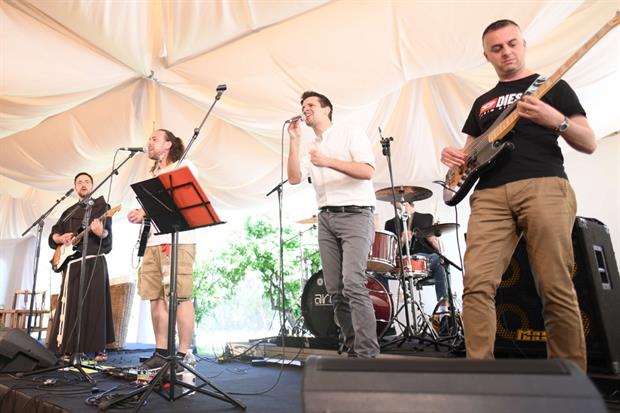
Lorenzo Belluscio and his band perform the hymn for the thirtieth anniversary of the World Day of the Sick “Guardians of humanity” at the conference – Photo Carla Picciau
Then I need to be reassured and embraced by my brothers and sisters, because in the encounter with the other I discover myself, with my needs and riches, and above all I discover the beauty of the gift, of gratuitousness, a strong element to rediscover, especially now, and which I consider the index of the quality of the report. Gratuitousness is the evaluation parameter of our being together, understood as the ability to give to the other freely as well as to receive, in humility. We all can and must give something, be it money or skills, time or listening, whether we are poor or rich: by giving, we can earn the status of “person in relationship”.
Then, I need to feel embraced by myself when I bring my living being back to my person, recomposing that unified totality that is man himself, threatened by distraction, disintegration, the speed of time and the power of conditioning. external. In the path of reconciliation with myself I find the strength of living, which is the gift of love connected to life.
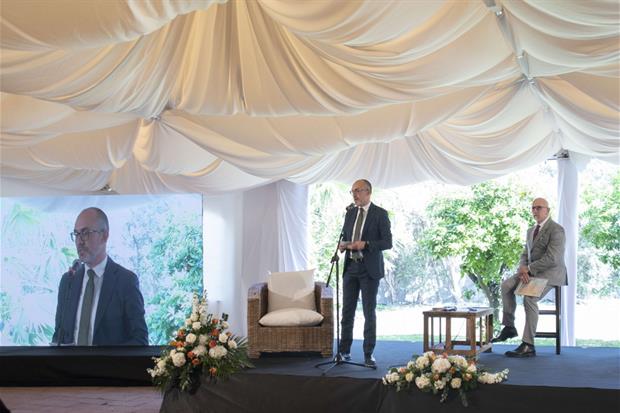
The mayor of Cagliari Paolo Truzzu brings his greetings to the conference – Photo Carla Picciau
Finally, I must remember why I live: a life made to love, give and welcome the gift of the Holy Spirit Paraclete, from whom comes salvation, strength, courage, comfort, reassurance and consolation. In this being together we rediscover the meaning of our journey as a pastoral care of health. The sense of smell, proposed in the title of this year’s conference – «From smell to perfume. To overcome the waste “- it was not easy to treat, yet we discovered that smell is one of the most important signs that condition our relationship: a bad smell can easily drive away, and those who live in the hospital know that bad smells you hear so many. If I let myself be conditioned by that bad smell, my relationship will be conditioned and the relationship I will have with that person could be conditioned in turn. I think we need to re-educate our senses to perceive smell and perfumes, to better enter into a relationship, but also to know how to overcome the bad smell that can come from the other, because the person is much more. Precisely this will allow us to avoid generating the gap that Pope Francis often speaks of.
Director of the CEI Office for the Pastoral Care of Health
